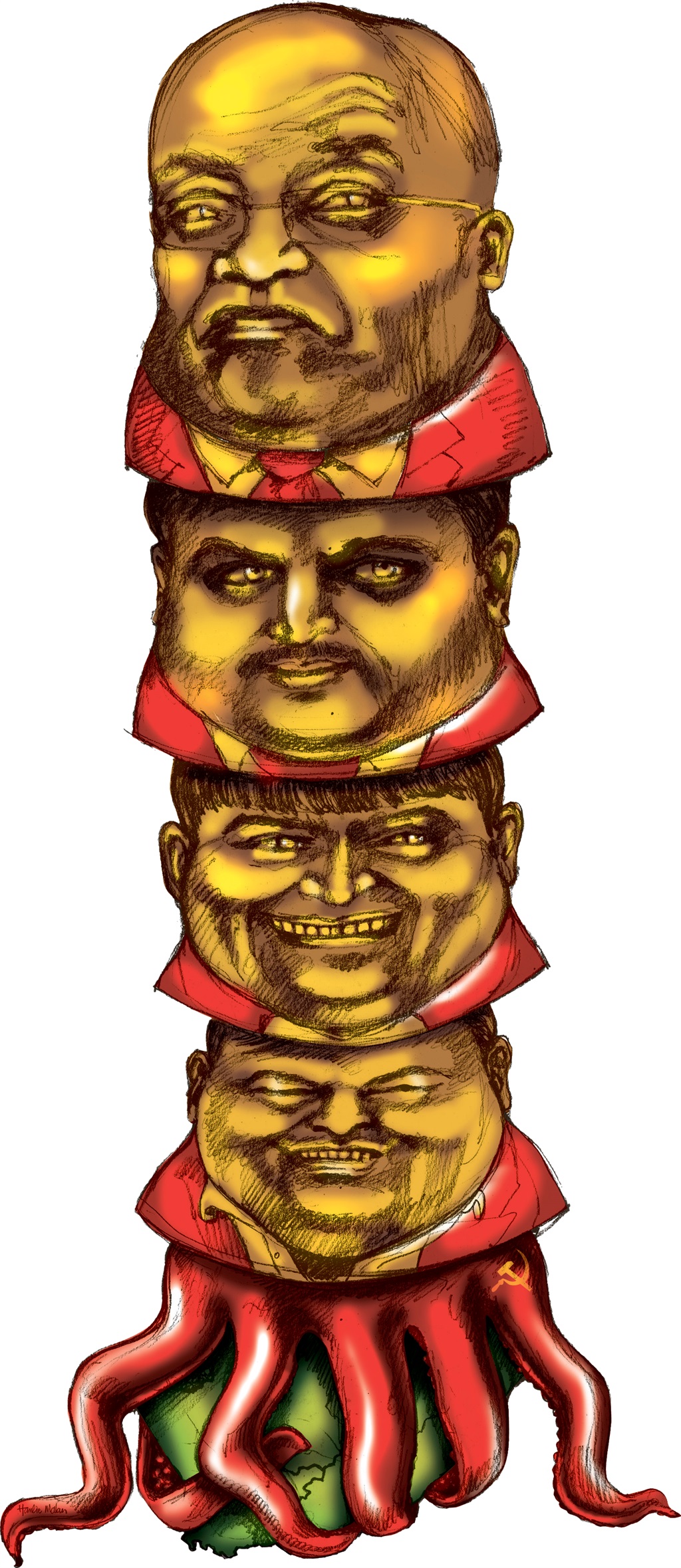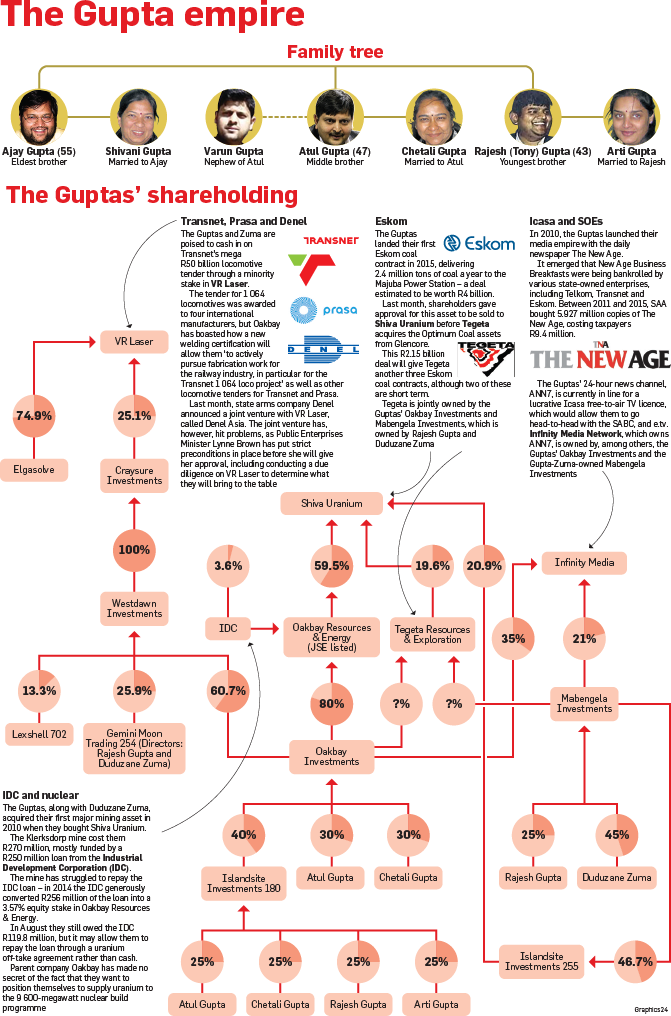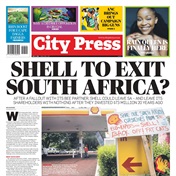
The ‘First Family’ is running SA, in the process consuming the soul of the ANC, writes Njabulo S Ndebele
With shocking new exposures coming at us almost daily, it is difficult to resist the feeling that it will prove extremely difficult for President Jacob Zuma to stay in power for much longer. The revelation that Deputy Finance Minister Mcebisi Jonas was brave and honourable enough to make has led to other, similar revelations.
What has been suspected all along has now been confirmed. The Guptas have strategically captured Zuma and, by remote control, have been running both government and the ANC with varying degrees of influence.
The Gupta-Zuma syndrome uses the strategy of finding sources of wealth for business, then identifies political enablers, enforcement instruments and instruments of governance to secure these sources. The Guptas deliver on the business angle. Zuma delivers on the latter.
The biggest prize for the Guptas was the popular mass appeal of Zuma the politician. He had the ANC firmly in his hands, and was able to centralise power around his popularity. He enjoyed the overwhelming support of labour federation Cosatu and the SA Communist Party.
There was also something elemental and existential about Zuma as the leader of the ANC. He had a history of insolvency, hundreds of criminal charges and more than 20 children to feed and educate. Thus, Zuma transferred his cash dependence from the convicted corrupter Schabir Shaik to the rumbustious Guptas.
They had a far more ambitious project than Shaik could ever have dreamt up. Their imagination and zest for power and riches appear to be of epic proportions. They want nothing less than a country in their pockets. They found in the ANC a political party in power whose vision had become so diminished in its focus on the personality of its leader that it had lost the capability to deploy a containing authority to overshadow the drive and energy of the rampant Gupta imagination. The visions of the ANC had gone limp.
In contrast to the ANC, the Guptas appear to demonstrate a systemic approach. With the Gupta-Zuma strategy in place, the challenge was to implement it. The roles and functions were clear. First, Zuma was to consolidate his political power. He would have to line up provinces to do his bidding. Thus far, the Free State, Mpumalanga and North West are the ducks currently in a row. It is easy to see why the premiers of these three provinces are dubbed the Premier League. Recently, KwaZulu-Natal appears to have been delivered to the Gupta-Zuma stable too.
Of the remaining provinces, Gauteng has pushed back. The Eastern Cape and Limpopo are wobbling. Their fate may very well be decided by which way political sentiment flows in reaction to the dramatic confirmation of the Guptas’ hand in Cabinet appointments.
Second in the implementation of the strategy is to secure state business instruments that would serve it. These are located in mining, transport, communications and finances, with their concomitant parastatals.
Third, the relevant enforcement institutions in the criminal justice system – the National Prosecuting Authority (NPA), SA Police Service and intelligence agencies – must be lined up.
Lastly, Zuma would have to deploy instruments of state to confer legal validity to decisions requiring the authority of his office. Zuma would be the one seen to appoint a minister, or some other critical state functionary in the NPA, Transnet, Eskom, the SA Revenue Service, the SABC, SAA and other parastatals. These appointments would be oriented towards interests other than those of the state. Zuma had to be eminently willing to be seen in this legitimising light, and to trust in his ability to keep the ANC in tow.
In light of the recent Jonas disclosure, this last part of the strategy is probably the most important. The Guptas, through Zuma as their legitimising front, in effect sought to replace the state as the object of its own institutions in favour of the Guptas as the primary beneficiaries of immeasurable wealth, followed by Zuma, his family, and then close political and business circles as collateral beneficiaries.
Why did the Gupta-Zuma syndicate think it could get away with it?
A number of things may have contributed to their sense of confidence. One of them was that Nkandla gave Zuma a trial run on how to put in place a system of benefiting from the state without a paper trail leading to him, except by implication. In such conditions, the Gupta-Zuma syndrome works at its best. It is able to deploy lawyers who are adept at assisting the president to defeat the ends of justice in violation of his oath of office.
The Gupta-Zuma syndrome also depends on a now-embedded culture in the ANC. In this, loyalty consistently trumps principle. The consequences of honesty in the ANC have been well documented. Vusi Pikoli’s book, My Second Initiation, is an engrossing testimony to the fate of the honest and the principled.
Pikoli was suspended by then president Thabo Mbeki and ultimately lost his job as national director of the NPA.
Since Mbeki suspended Pikoli, the governance quandary that faced him and Pikoli has become a bigger threat to national security than crime. The capability to deal effectively with crime depends on the strength of state institutions and the quality of the officers who work in them. The capacity to fight crime through the integrity of the state, its laws, regulations, and officers appointed and elected to public office has been cumulatively and dangerously diminished, particularly since Zuma came to power.
The overall effect of the Gupta-Zuma syndrome is extensive. The integrity of the state and its capacity to take care of its citizens have been severely curtailed; the sense of authority emanating from the office of the president as the embodiment of the aspirations of its people has declined significantly. A private house in Saxonwold has in effect become the Union Buildings; its occupants landed their private jet at an air force base as if they were heads of state, in the process dealing a heavy blow to the credibility of the defence force.
The system of patronage has developed to almost all-encompassing levels, especially in the ANC, where one could hazard a guess that one compromised member knows plenty of others who are equally compromised – another ideal condition for the Gupta-Zuma syndrome to flourish.
Pikoli chose to be faithful to his oath of office and lost his job. Zuma, who has not been faithful to his oath of office, is still in office. Members of his party in Parliament, who have unanimously supported and defended him – some despite their best conscience – are also still in office. They have emerged looking dishonest in their flagrant disregard of their oaths, as they wilfully support a leader who wilfully misleads them.
The toll on individuals for deploying vast personal energies to deliver faulty arguments in a bid to turn right into wrong must be high, particularly on self-respect and on bodies seized by insomnia as a result of anguished consciences.
Some of these people will be among those meeting this weekend in the national executive committee (NEC) of the ANC to discuss the import of Jonas’ revelations. Will loyalty continue to trump principle, or will principle prevail? The choices are stark, each with severe or recuperative implications.
Will the collective of the NEC be able to see the part of the problem locked inside each of them? Will they, as individuals with constituencies, be able to look their people in the eyes? Will they see in each person before them a representative of 54 million people who have pinned their hopes on them, or will they continue to recognise only the face of their leader, a man who has wreaked so much havoc?
Will they begin to reimagine South Africa beyond the banalities to which their country has been reduced on their watch?
Will they, at the end of their meeting, rise and resolve to uphold and defend the Constitution of the Republic of South Africa?
Ndebele is an associate research fellow of the Archive and Public Culture Research Initiative at the University of Cape Town, a fellow of the Stellenbosch Institute for Advanced Study and the chancellor of the University of Johannesburg




 Publications
Publications
 Partners
Partners









